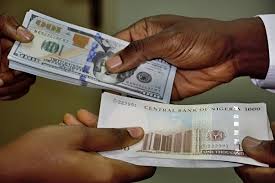The Nigerian naira has seen a recovery from record lows this year, thanks to an increase in interest rates and the sale of dollars directly to foreign exchange bureaus. The naira closed at 1,278 per dollar on April 2, down from 1,500 in February, as per data from the Lagos-based FMDQ exchange tracking trading.
Investing management firm Cardinal Stone reports Nigeria’s naira strengthened 11.4% in official markets since March 1, becoming a top performer in Africa, with foreign inflows of $2.1 billion this year.
The recovery comes after the currency’s value plummeted in the wake of economic reforms imposed by President Bola Tinubu’s administration after he took office last May. He removed a fixed currency peg and multiple exchange rates, instead allowing the naira’s value to be market determined. The exchange rate was about 755 naira to the dollar in the two weeks after Tinubu took office, but crossed 1,000 naira to the dollar by the end of 2023.
The Central Bank of Nigeria has devalued the naira twice in the past year and raised the benchmark interest rate to 24.75% since February to combat inflation.
Nigeria’s inflationary pressure is influenced by foreign exchange concerns and dollar shortages due to oil industry income shortfalls, partly due to pipeline vandalism.
The CBN is resuming a weekly $20,000 sale to licensed bureau de change merchants and deposit banks, causing banks operating internationally to now require 500 billion naira ($353 million) as their capital.
Nigeria’s currency decline between October and February, affecting food, transportation, and living costs, has led to increased inflation and worsening living costs due to reliance on dollar-denominated imports.
The central bank’s interventions were well-timed, as lower exchange rates and a narrower difference between official and parallel market exchange rates indicate less demand for dollars outside bank channels.
Nigeria’s CBN’s tough stance, including clamping down on Binance for exacerbating naira depreciation, has resulted in some stability in the decreasing demand for USDT coin among 70,000 students studying abroad.
The CBN’s defense of the naira is costly due to its reliance on Nigeria’s forex reserves and bond and treasury bill sales.
Financial Derivatives, a Lagos-based consultancy, cited the CBN’s $7 billion settlement of a forward commitment backlog as a reason for increased confidence in Nigeria’s central bank.
Goldman Sachs predicts the dollar’s value to rise to 1,200 naira within the next 12 months, while Cardinal Stone anticipates further enhancements in FX reserves.


